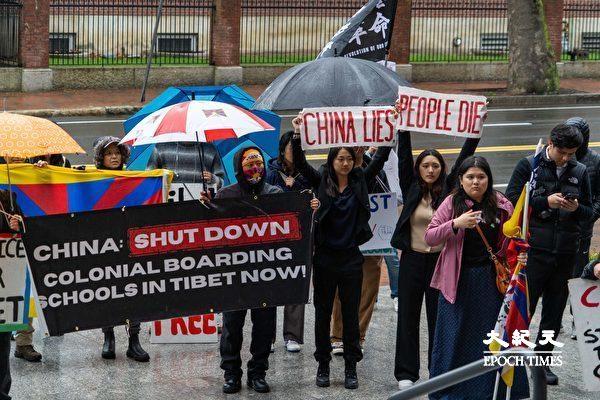Who would have thought that 140 character bursts of text—often used for reporting quotidian trivialities in places like the U.S.—would become a beacon of hope for civil rights activists under a quasi-totalitarian regime?
Twitter, a web-based service that allows users to input brief text strings and share them with thousands of followers, has in China become a powerful tool for dissidents to network and mobilize. Users are able to follow the updates (or “tweets”) of people they follow, and know immediately if they are being hunted by Chinese police, and rush to their aid if a tweet so calls for it.
And this is precisely what happened on the night of Dec. 23 last year when Teng Biao, a civil rights lawyer and university professor from Beijing visited his friend Fan Yafeng’s mother, along with another friend, Zhang Yongpan. At Fan’s mother’s house they were confronted by police who demanded to see their identification.
Teng, ever the lawyer, began to tell them that they had no right to make the demand. Incensed, the police simply strong-armed the pair back to the station where they were bashed and abused.
Just as the incident began heating up Teng made several tweets on his mobile phone, alerting over 20,000 followers (who then tweeted their own followers) that he was in danger. Bloggers immediately discovered and published the address of the police station and the contact information of the policemen and police chief.
Before long the station was besieged by activists and fellow lawyers, and before midnight Teng and his friend were released (though not before going through a harrowing ordeal) .
On the evening of Dec. 18, a group of Beijing human rights lawyers, including Zhang Kai, Li Heping, Wang Quanzhang, and others went to Holy Mountain (Shengshan) Cultural Research Institute to visit Dr. Fan Yafeng, who was recently released after being illegally detained. They were stopped by authorities and taken to a police station. In a similar incident, after sending tweets the lawyers were released, thanks to the help of Beijing lawyers, bloggers, and reporters who went to the police station to demand it.
The uptake of tools like Twitter is helping promote genuine civil society in China, despite all the authorities’ efforts to the contrary.
At least, Beijing human rights lawyer Jiang Tianyong believes that to be the case: “There’s a widespread awakening of civic consciousness, and many groups have been formed, such as that of human rights lawyers, private media, and citizen reporters,” he said “They interconnect through Twitter to post announcements and organize activities.”
Jiang said that some Twitter followers were fearful at first, but became confident after seeing others participate successfully. “This proves that a few people who dare to take action can greatly motivate and inspire many others.”
He says that when activist Twitter users encounter police, secret police, or other rogues of Chinese officialdom, they find that the authorities are more afraid than they. “The authorities’ threats usually have no legal basis, and once the threats lose effectiveness, they have no other way to deal with Twitter followers,” he said.
Zhang Jianping, the executive director of the Rights Movement, says that a group of people following and watching an incident can expose it and make defending rights a public affair.
He feels that as petitioning and litigation prove increasingly fruitless, group participation using Twitter will become more popular and the more people following and watching an incident, the greater the effect.
Twitter’s unique way of inviting group participation is now only a small movement, but Jiang suggests it will have a larger impact in the future. “Twitter is changing Chinese society. Just by using a cell phone, people can post ‘tweets’ and pictures straight from the scene, making the government’s information blockade impossible.”
[email protected]
Read the original Chinese article.
Twitter, a web-based service that allows users to input brief text strings and share them with thousands of followers, has in China become a powerful tool for dissidents to network and mobilize. Users are able to follow the updates (or “tweets”) of people they follow, and know immediately if they are being hunted by Chinese police, and rush to their aid if a tweet so calls for it.
And this is precisely what happened on the night of Dec. 23 last year when Teng Biao, a civil rights lawyer and university professor from Beijing visited his friend Fan Yafeng’s mother, along with another friend, Zhang Yongpan. At Fan’s mother’s house they were confronted by police who demanded to see their identification.
Teng, ever the lawyer, began to tell them that they had no right to make the demand. Incensed, the police simply strong-armed the pair back to the station where they were bashed and abused.
Just as the incident began heating up Teng made several tweets on his mobile phone, alerting over 20,000 followers (who then tweeted their own followers) that he was in danger. Bloggers immediately discovered and published the address of the police station and the contact information of the policemen and police chief.
Before long the station was besieged by activists and fellow lawyers, and before midnight Teng and his friend were released (though not before going through a harrowing ordeal) .
On the evening of Dec. 18, a group of Beijing human rights lawyers, including Zhang Kai, Li Heping, Wang Quanzhang, and others went to Holy Mountain (Shengshan) Cultural Research Institute to visit Dr. Fan Yafeng, who was recently released after being illegally detained. They were stopped by authorities and taken to a police station. In a similar incident, after sending tweets the lawyers were released, thanks to the help of Beijing lawyers, bloggers, and reporters who went to the police station to demand it.
The uptake of tools like Twitter is helping promote genuine civil society in China, despite all the authorities’ efforts to the contrary.
At least, Beijing human rights lawyer Jiang Tianyong believes that to be the case: “There’s a widespread awakening of civic consciousness, and many groups have been formed, such as that of human rights lawyers, private media, and citizen reporters,” he said “They interconnect through Twitter to post announcements and organize activities.”
Jiang said that some Twitter followers were fearful at first, but became confident after seeing others participate successfully. “This proves that a few people who dare to take action can greatly motivate and inspire many others.”
He says that when activist Twitter users encounter police, secret police, or other rogues of Chinese officialdom, they find that the authorities are more afraid than they. “The authorities’ threats usually have no legal basis, and once the threats lose effectiveness, they have no other way to deal with Twitter followers,” he said.
Zhang Jianping, the executive director of the Rights Movement, says that a group of people following and watching an incident can expose it and make defending rights a public affair.
He feels that as petitioning and litigation prove increasingly fruitless, group participation using Twitter will become more popular and the more people following and watching an incident, the greater the effect.
Twitter’s unique way of inviting group participation is now only a small movement, but Jiang suggests it will have a larger impact in the future. “Twitter is changing Chinese society. Just by using a cell phone, people can post ‘tweets’ and pictures straight from the scene, making the government’s information blockade impossible.”
[email protected]
Read the original Chinese article.





